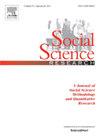Subjective religiosity and perceived control in later life
IF 3.5
2区 社会学
Q1 SOCIOLOGY
引用次数: 0
Abstract
Studies report bidirectional effects of subjective religiosity with perceived control. Neuroscience and systems biology literatures yield reasons to expect structure emergence in their joint dynamics. Such dispositional patterns become especially important in later life, given the unique challenges and constraints aging entails. They might, however, only manifest over long time periods. Studies have only investigated short-term patterns, leaving these extended possibilities unexamined. In the current investigation, I address the gaps. My data are from the 2006–2018 waves of the Health and Retirement Study, nationally representative of U.S. adults over age 50. For analysis, I use a fixed-effects cross-lagged panel model (FE-CLPM) approach. Men's results indicate that each disposition diminishes the other in the short term, indicating their alternating and possibly transient salience to personality. Long-run monotonic effects—newly detectable through FE-CLPM—are consistent with set-point change rather than mere fluctuations. Path-specific extended patterns suggest benefits of repeated noetic investments. Substantively, the two tendencies seem to form a particular temperamental career wherein agency is attributed to self or to God.
主观的宗教信仰和晚年生活中的感知控制
研究报告了主观宗教信仰与感知控制的双向影响。神经科学和系统生物学的文献给出了期望在关节动力学中出现结构的理由。鉴于老龄化带来的独特挑战和限制,这种性格模式在晚年生活中变得尤为重要。然而,它们可能只会在很长一段时间内显现出来。研究只调查了短期模式,而没有研究这些扩展的可能性。在目前的调查中,我解决了差距。我的数据来自2006-2018年健康与退休研究的浪潮,这是美国50岁以上成年人的全国代表。为了进行分析,我使用固定效应交叉滞后面板模型(FE-CLPM)方法。男性的研究结果表明,每一种性格都会在短期内削弱另一种性格,表明它们在个性中交替出现,甚至可能是短暂的突出。通过fe - clpm新检测到的长期单调效应与设定值变化一致,而不仅仅是波动。路径特定的扩展模式表明重复的智力投资的好处。从本质上讲,这两种倾向似乎形成了一种特殊的喜怒无常的职业生涯,其中代理被归因于自我或上帝。
本文章由计算机程序翻译,如有差异,请以英文原文为准。
求助全文
约1分钟内获得全文
求助全文
来源期刊

Social Science Research
SOCIOLOGY-
CiteScore
4.30
自引率
4.00%
发文量
0
审稿时长
65 days
期刊介绍:
Social Science Research publishes papers devoted to quantitative social science research and methodology. The journal features articles that illustrate the use of quantitative methods in the empirical solution of substantive problems, and emphasizes those concerned with issues or methods that cut across traditional disciplinary lines. Special attention is given to methods that have been used by only one particular social science discipline, but that may have application to a broader range of areas.
 求助内容:
求助内容: 应助结果提醒方式:
应助结果提醒方式:


